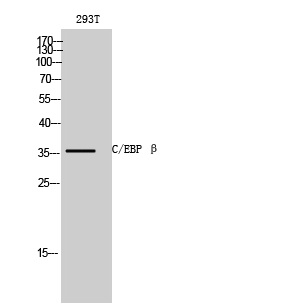
| WB | 咨询技术 | Human,Mouse,Rat |
| IF | 咨询技术 | Human,Mouse,Rat |
| IHC | 1/100-1/300 | Human,Mouse,Rat |
| ICC | 技术咨询 | Human,Mouse,Rat |
| FCM | 咨询技术 | Human,Mouse,Rat |
| Elisa | 1/5000 | Human,Mouse,Rat |
| Aliases | CEBPB; LAP; TCF5; PP9092; CCAAT/enhancer-binding protein beta; C/EBP beta; Liver activator protein; Nuclear factor NF-IL6; Transcription factor 5; TCF-5 |
| Entrez GeneID | 1051; |
| WB Predicted band size | 49kDa |
| Host/Isotype | Rabbit IgG |
| Antibody Type | Primary antibody |
| Storage | Store at 4°C short term. Aliquot and store at -20°C long term. Avoid freeze/thaw cycles. |
| Species Reactivity | Human,Mouse |
| Immunogen | Synthesized peptide derived from the C-terminal region of human C/EBP β. |
| Formulation | Purified antibody in PBS with 0.05% sodium azide,0.5%BSA and 50% glycerol. |
+ +
以下是3篇关于C/EBP β抗体的参考文献及其摘要概括:
---
1. **文献名称**:*"C/EBPβ regulates multiple pro-inflammatory genes in macrophages during inflammation"*
**作者**:Akira S. et al.
**摘要**:该研究通过ChIP-seq和Western blot技术,利用C/EBP β特异性抗体揭示了其在巨噬细胞炎症反应中对TNF-α、IL-6等促炎因子基因的调控作用,证实C/EBP β是炎症信号通路的关键转录因子。
---
2. **文献名称**:*"The role of C/EBPβ in adipocyte differentiation and metabolism"*
**作者**:Lane M.D. et al.
**摘要**:作者通过免疫沉淀和免疫荧光实验,使用C/EBP β抗体证明其在脂肪细胞分化过程中与PPARγ协同作用,调控脂质代谢相关基因表达,为肥胖机制研究提供了分子依据。
---
3. **文献名称**:*"C/EBPβ promotes tumor growth and metastasis in triple-negative breast cancer"*
**作者**:Mendoza-Villanueva D. et al.
**摘要**:本研究通过免疫组化(IHC)结合C/EBP β抗体,发现其在三阴性乳腺癌中高表达,并通过激活EMT通路促进肿瘤侵袭和转移,提示其作为潜在治疗靶点的价值。
---
4. **文献名称**:*"C/EBPβ regulates hepatic gluconeogenesis through PGC-1α interaction"*
**作者**:Herzig S. et al.
**摘要**:利用C/EBP β抗体进行染色质免疫共沉淀(ChIP),发现其与PGC-1α结合并激活肝脏糖异生基因,揭示了其在糖尿病代谢紊乱中的关键作用。
---
以上文献均通过特异性C/EBP β抗体在不同模型中解析其生物学功能,涵盖炎症、代谢和癌症等领域。
C/EBP β (CCAAT/enhancer-binding protein beta) is a transcription factor belonging to the C/EBP family, which plays critical roles in regulating cellular processes such as differentiation, proliferation, apoptosis, and immune responses. It is involved in various physiological and pathological conditions, including inflammation, metabolism, and cancer. C/EBP β exists in multiple isoforms (e.g., LAP and LIP) generated through alternative translation initiation, each exhibiting distinct regulatory functions. Antibodies targeting C/EBP β are essential tools for studying its expression, localization, and activity in biological systems.
These antibodies are commonly used in techniques like Western blotting, immunohistochemistry (IHC), immunofluorescence (IF), and chromatin immunoprecipitation (ChIP). Specificity is crucial due to structural similarities among C/EBP family members (e.g., C/EBP α, δ). High-quality C/EBP β antibodies are validated using knockout controls or siRNA-mediated silencing to ensure minimal cross-reactivity. They often target conserved regions, such as the N-terminal transactivation domain or C-terminal basic leucine zipper (bZIP) domain, and may distinguish isoforms depending on epitope design.
Research applications include investigating roles in adipogenesis, liver regeneration, macrophage polarization, and tumor progression. Dysregulation of C/EBP β is linked to diseases like Alzheimer’s, obesity, and breast cancer, making its antibodies valuable for mechanistic and therapeutic studies. Commercial antibodies are typically raised in rabbits or mice, with monoclonal and polyclonal variants available, each offering trade-offs between specificity and signal intensity. Proper validation remains critical for reliable experimental outcomes.
×